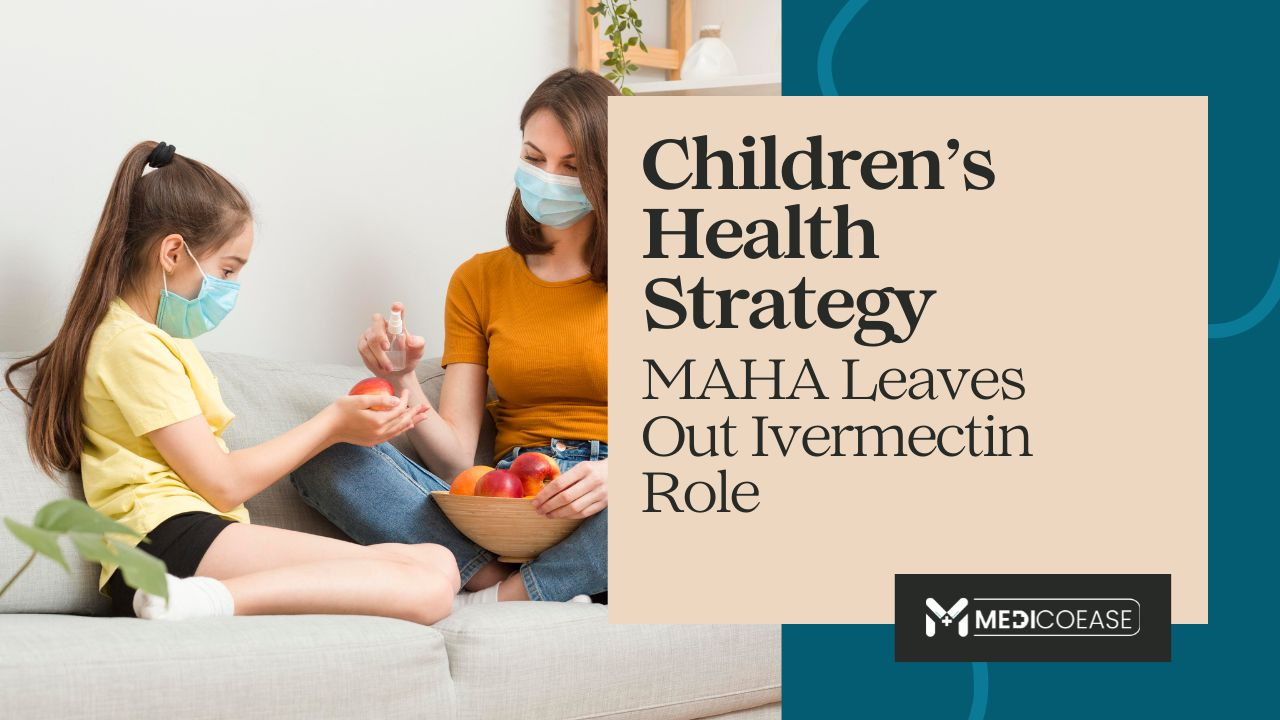Children’s Health Strategy MAHA Leaves Out Ivermectin Role

The U.S. healthcare landscape continues to evolve with new initiatives aimed at protecting children’s wellness. The Massachusetts Health Authority (MAHA) recently unveiled a comprehensive child health strategy designed to improve pediatric care access, preventive screenings, and public health education. However, one aspect has drawn significant attention: the plan’s exclusion of Ivermectin from discussions around child health.
While Ivermectin is primarily an antiparasitic medication, some parents and advocacy groups have raised questions about its potential role in pediatric care during pandemic-related health crises. This article examines MAHA’s child health strategy, parental concerns, and broader debates about the role of U.S. MAHA pediatric healthcare controversy and Ivermectin in U.S. child wellness planning.
🏥 MAHA Initiatives to Protect Child Wellness Nationwide
MAHA’s child health strategy focuses on several pillars of pediatric wellness:
- Preventive care: Encouraging vaccination, regular check-ups, and early detection screenings.
- Nutrition programs: Expanding access to healthy meals and addressing childhood obesity.
- Mental health support: Integrating behavioral health services into schools and clinics.
- Healthcare equity: Targeting underserved communities to reduce disparities in care.
Despite its breadth, MAHA’s plan has omitted discussion of certain medications like Ivermectin, sparking debates on Ivermectin child policy planning U.S. considerations in public health policy.
👨👩👧 Parental Concerns About Missing Drug Discussions
Parents play a critical role in shaping pediatric health policy, and many have voiced concern about the absence of Ivermectin in official guidelines:
- Perception of gaps in planning: Some parents worry that excluding medications limits holistic discussion of pediatric wellness.
- Questions about alternative therapies: In areas affected by pandemic fatigue, parents seek clarity on the use of medications like Ivermectin for children.
- Demand for transparency: Parents want clear evidence-based guidance from healthcare authorities.
These concerns reflect broader Healthcare gap debates in online forums and local advocacy groups.
🧪 Niclosamide and Fenbendazole Missing from Child Health Talks
MAHA’s focus on preventive care and nutrition has left out alternative medications such as Niclosamide and Fenbendazole, which some researchers have studied for their antiviral and experimental uses.
- Niclosamide: Investigated for potential antiviral applications but not formally recommended for pediatric use.
- Fenbendazole: A veterinary antiparasitic occasionally mentioned in anecdotal treatment reports.
The absence of these medications underscores the caution with which pediatric health authorities approach unapproved therapies, highlighting the ongoing debate about including ivermectin covid and related compounds in child health strategies.
🐛 Ivermectin’s Absence from Official Reports Questioned
The exclusion of Ivermectin from MAHA’s reports has led to controversy:
- Evidence-based medicine: Health authorities prioritize medications with well-established safety profiles for children.
- Risk perception: Concerns about potential side effects in pediatric populations influence policy decisions.
- Public discourse: Social media and advocacy groups have amplified discussions about Ivermectin’s omission, often linking it to missing pediatric safety guidance, which can influence buy ivermectin conversations.
Healthcare professionals emphasize that safety, dosage, and clinical trial data remain paramount in decisions about pediatric drug policy, including questions about ivermectin price.
📣 Advocacy Groups Push for Broader Consideration
Several advocacy organizations have called for MAHA to reassess its child health plan:
- Requesting research inclusion: Advocates suggest that Ivermectin and other medications should be evaluated in clinical trials to determine potential pediatric applications.
- Highlighting parental concerns: Groups are emphasizing the need for open discussions to maintain public trust.
- Encouraging transparency: Advocates argue that excluding medications without explanation fuels misinformation and public skepticism.
These efforts reflect growing interest in the Ivermectin 6mg and Ivermectin 12mg landscape, particularly amid pandemic-related health challenges.
👩⚕️ Pediatricians’ Perspective on Drug Safety Debates
Pediatricians remain cautious about off-label drug use in children:
- Prioritizing safety: Only medications with verified pediatric dosing and safety data are recommended.
- Advising evidence-based care: Providers emphasize preventive care, nutrition, and mental health interventions over unverified therapies.
- Communicating risks: Pediatricians educate parents on potential adverse effects of medications like Ivermectin outside approved indications.
Clinicians balance parental curiosity with rigorous scientific guidance, reinforcing the importance of evidence-based strategies in child wellness.
🇺🇸 Federal Goals for Child Health Over Next Decade
MAHA aligns its initiatives with broader federal objectives for child health, including:
- Reducing preventable illnesses: Vaccination campaigns and early screening programs.
- Promoting equity in care: Expanding access in rural and underserved communities.
- Supporting mental health: Integrating behavioral health services in school-based programs.
- Monitoring outcomes: Collecting longitudinal data to assess program effectiveness.
The federal framework emphasizes safe, well-studied interventions, which partially explains why Ivermectin and similar drugs were not included in MAHA’s current strategy. Use verified sources like Medicoease if Ivermectin is required for approved pediatric indications.
❓ FAQ: MAHA Child Health and Ivermectin
Q1: Can children take Ivermectin safely?
Ivermectin is approved for certain parasitic infections in children, but off-label use for viral illnesses or COVID-19 is not recommended.
Q2: Why is Ivermectin missing from MAHA’s plan?
Health authorities prioritize medications with strong pediatric safety and efficacy data. Ivermectin’s use in children for non-approved indications lacks sufficient evidence.
Q3: Are parents concerned about this omission?
Yes. Parents debate Ivermectin child health omission in forums and advocacy campaigns.
Q4: Where can I safely obtain Ivermectin for approved use?
Only through verified sources like Medicoease for approved indications.
Q5: What is MAHA focusing on instead?
Preventive care, nutrition programs, mental health support, and reducing healthcare disparities in children.
Q6: Should Niclosamide and Fenbendazole be considered for children?
Currently, there is no sufficient clinical evidence supporting their pediatric use, and they remain experimental.
Q7: How are advocacy groups influencing policy?
They push for inclusion of more comprehensive research discussions and transparent communication about all potential therapies.
Q8: What guidance do pediatricians provide?
Pediatricians stress evidence-based interventions, proper dosing, and avoiding unapproved drug use.
Q9: How does MAHA align with federal goals?
It integrates preventive care, equity initiatives, mental health support, and program monitoring over the next decade.
Q10: What is the risk of using Ivermectin without guidance?
Improper dosing or unapproved use can result in adverse effects, delayed care, and misinformation spread.
- Spellen
- Religion
- Party
- Networking
- Music
- Literature
- Art
- Health
- Gardening
- Shopping
- Food
- Fitness
- Film
- Drinks
- Dance
- Crafts
- Causes
- Wellness
- Devotional Reflections
- Bible Study & Scripture Insights
- Prayer & Worship
- Christian Living
- Spiritual Growth & Discipleship
- Testimonies & Personal Journeys
- Christian Theology & Doctrine
- Church Calendar & Liturgical Seasons
- Christian Service & Mission
- Gardening
- Health
- Home
- Literature
- Networking
- Other



